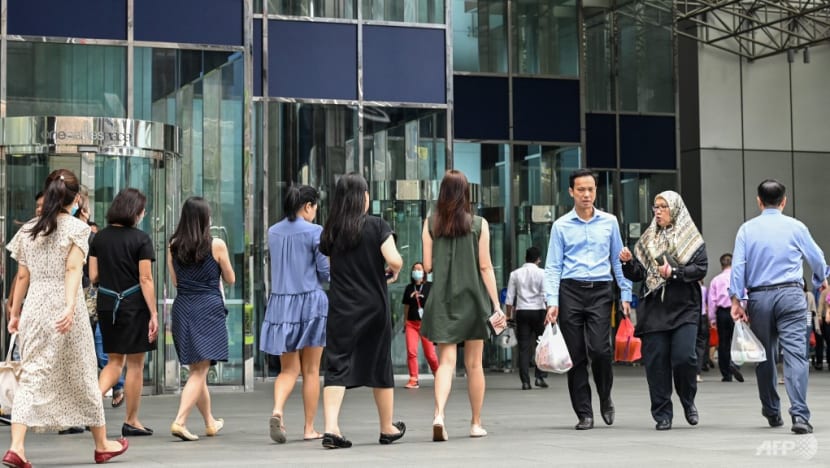Guidelines on non-compete clauses being finalised; out second half of 2024: Tan See Leng
The government does not condone any exploitative employment contracts, said the Manpower Minister.

A lunchtime crowd is seen at Raffles Place in Singapore on Feb 16, 2023. (File photo: AFP/Roslan Rahman)

This audio is generated by an AI tool.
SINGAPORE: Guidelines on the use of a job stipulation that restricts an employee from working for a competitor are being finalised and are expected to be made known in the second half of 2024, the Manpower Minister Tan See Leng announced on Tuesday (Feb 6).
Also known as restraint of trade clauses, the non-compete rule has caused unease recently with high-profile examples from two big-name tech firms.
Former Lazada employees who spoke to CNA after the retrenchment exercise in early January questioned their 12-month non-compete clause that covered an extensive list of tech, retail and logistics companies.
Last week, the courts dismissed Shopee's requests for injunctions against a former employee who resigned and moved to ByteDance. When he first joined Shopee, he had signed a Restrictive Covenants Agreement with a non-solicitation and non-competition clause, as well as an Employee Confidentiality Agreement.
“We understand that overly restrictive restraint of trade clauses can disadvantage retrenched employees and create difficulties in finding employment,” said Dr Tan, responding to several parliamentary questions about Lazada’s recent retrenchment exercise.
The Ministry of Manpower (MOM) and its tripartite partners are developing guidelines that will educate employers and shape norms, similar to how other sets of guidelines are currently used, Dr Tan added.
The civil courts have “clear established principles” on when such clauses are acceptable and can be upheld in court, or when they are unreasonable and unjustified, said Dr Tan.
The courts will assess if there is a “genuine business need” and whether the company has scoped the clause reasonably based on sector, geographical areas and duration, he added.
They will also balance an employer’s need to safeguard their businesses and the employees’ ability to earn a living, said Dr Tan, noting that the clause should not be used to help businesses gain unfair advantages.
“Employees who believe that they are affected by unreasonable or unjustified restraint of trade clauses can seek assistance from their unions, from TAFEP (Tripartite Alliance for Fair & Progressive Employment Practices) or from MOM.”
FORFEITURE OF RESTRICTED STOCK UNITS
Dr Tan also responded to Associate Professor Jamus Lim (WP-Sengkang) who asked if MOM condones the forfeiting of unvested restricted stock units (RSUs) by companies even in the event of a retrenchment, rather than a resignation.
Only non-workmen, or those who are not mainly involved in manual labour, may be paid salary via stock options, including RSUs, said Dr Tan.
These are best discussed between the employer and employee as part of employment contract negotiations, he added.
“Employment contracts should clearly indicate the conditions under which unvested RSUs are forfeited. As these RSUs are typically given to employees in senior positions, they would be able to negotiate the terms with their employers,” he continued, adding that MOM does not track the prevalence of issuing RSUs.
Similar to non-compete clauses, employees with disputes over RSUs can file a claim with the Tripartite Alliance for Dispute Management for mediation. If this fails, the claim may be referred to the Employment Claims Tribunals for adjudication, said the Manpower Minister.
For claims that exceed the claim limits of the tribunals, employees will need to start a civil claim at the courts, he added.
In a supplementary question, Assoc Prof Lim asked if MOM would consider directly prohibiting non-compete clauses, specifically for lower- to mid-level employees.
“My concern has to do with the danger of this kind of inclusion of such boilerplate language for mid-level and low-level roles because of the chilling effect it can have for employment in general,” he added, noting that many of these employees also cannot afford legal recourse.
In response, Dr Tan said that MOM does not intend to introduce more regulations.
SUBMITTING RETRENCHMENT NOTICES
On Monday, Members of Parliament also asked about Mandatory Retrenchment Notifications (MRNs) and whether Lazada complied with these rules.
The online retail giant submitted the MRNs for its January 2024 retrenchment exercise on time, within five working days after its employees were notified, said Dr Tan.
However, Lazada did not notify the Food Drinks and Allied Workers Union (FDAWU) about the retrenchment exercise, which is not in line with the Tripartite Advisory on Managing Excess Manpower and Responsible Retrenchment (TAMEM), he noted.
Lazada later apologised and, following negotiations with the union, announced on Feb 4 that eligible union members who were retrenched would get an “enhanced support package”. Retrenched workers were initially told that they would receive two weeks' salary for every year of service.
With several “high-profile” retrenchments, Nominated Member of Parliament Neil Parekh asked about the job market in Singapore over the next few months.
The government assesses that while the economy is projected to improve in 2024, downside risks in the global economy remain, said Dr Tan in his response on Monday.
He reminded employers that retrenchment is difficult for employees too, because it takes an “emotional toll” and affects their livelihoods.
Singapore’s approach is balanced to protect workers but also give businesses the flexibility to adjust to market conditions, he said on Tuesday.
“This balanced ecosystem ultimately creates good jobs and sustains them for Singaporeans. And it ensures that even when workers are retrenched, the chances of finding another good job … the chances are high.”















